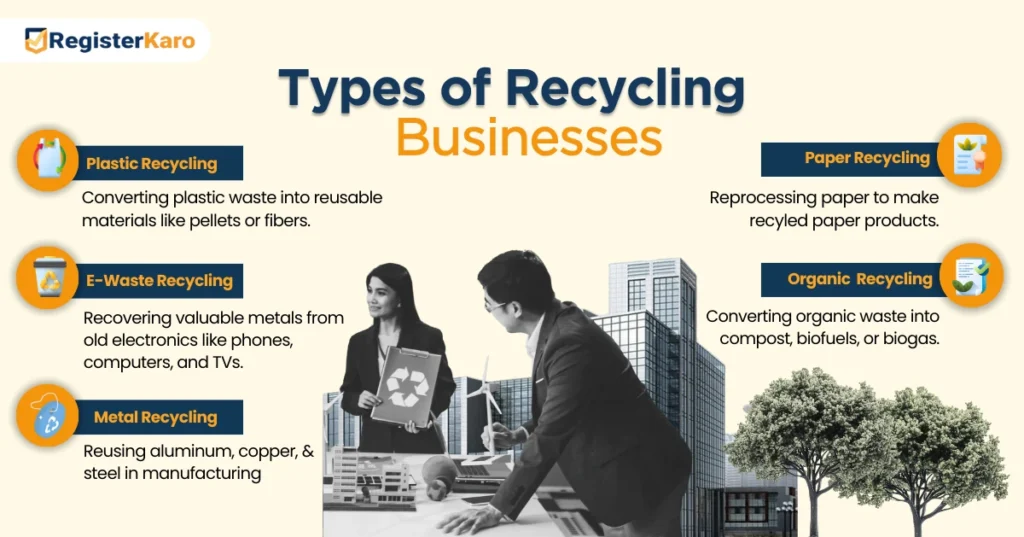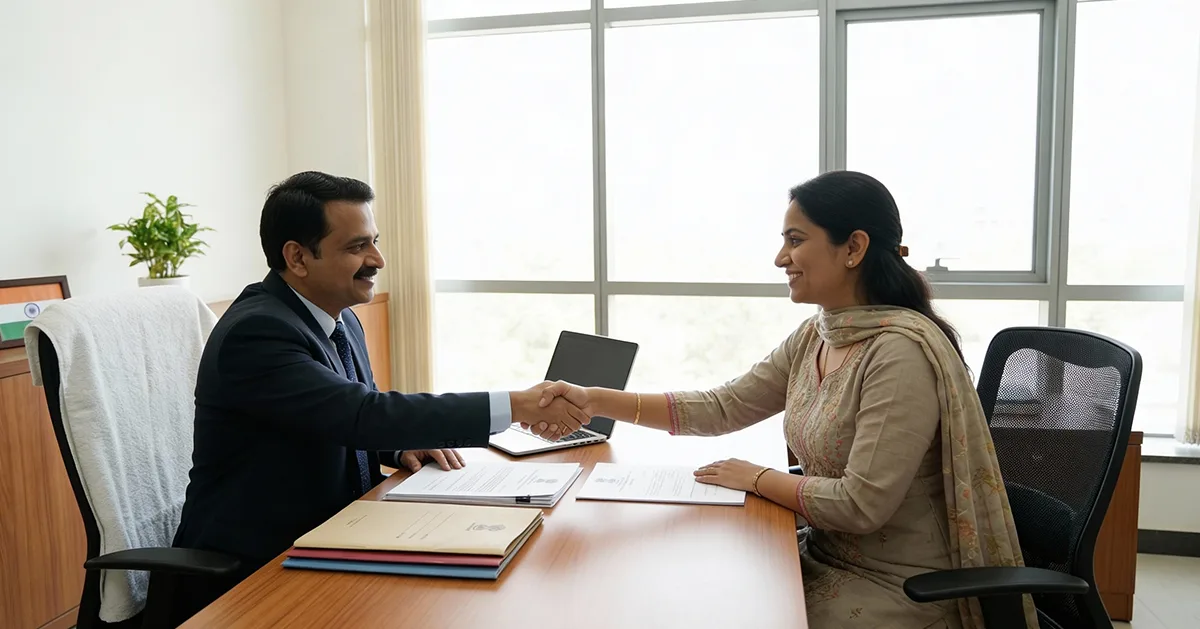
1. Overview of the Recycling Industry in India
In today’s rapidly changing world, sustainable waste management and recycling have become crucial for environmental conservation and long-term sustainability. If you’re considering starting a recycling business in India, you’re not only tapping into a growing industry but also contributing to a cleaner and greener planet through eco-friendly recycling practices.
This comprehensive guide will walk you through everything you need to know about starting a recycling business in India, from legal requirements and business structure to finding funding options and managing operations efficiently.
The recycling industry in India is undergoing rapid transformation due to growing environmental concerns, urbanization, and increased waste generation. India generates around 62 million tonnes of waste annually, and only a fraction of it is properly recycled. With the Indian government’s increasing focus on sustainable waste management and green initiatives, the recycling sector is set for significant growth in the coming years, opening up ample opportunities for eco-friendly recycling businesses.
2. Importance of Recycling for Sustainability & Economy
Recycling plays a pivotal role in sustainability by reducing the need for raw materials, lowering carbon emissions, and conserving energy. Additionally, it helps reduce the burden on landfills and saves natural resources. For the economy, the recycling industry creates jobs, contributes to the circular economy, and offers new business opportunities. Establishing a recycling business in India can, therefore, be both environmentally and economically rewarding.
3. Understanding the Recycling Business
A recycling business involves collecting, sorting, and processing waste materials to produce reusable products or raw materials. These materials could range from plastics, metals, and paper to electronic waste (e-waste) and organic waste. The process involves various stages, including waste collection, sorting, processing, and reselling the recycled material to manufacturers or other industries.
4. Types of Recycling Businesses
When starting a business in India, it’s essential to decide what type of recycling business you want to focus on. Some popular types include:
- Plastic Recycling: Recycling plastic waste into reusable materials such as pellets or fibers.
- E-Waste Recycling: Processing electronic waste such as old phones, computers, and televisions to recover valuable metals.
- Metal Recycling: Recycling metals like aluminum, copper, and steel for reuse in manufacturing.
- Paper Recycling: Reprocessing paper to make recycled paper products.
- Organic Waste Recycling: Converting organic waste into compost, biofuels, or biogas.

5. Market Potential and Business Opportunities
The demand for recycled materials in India is on the rise, driven by increased awareness of sustainability, government incentives, and the growing need for eco-friendly recycling alternatives in industries like packaging, construction, and electronics. The recycling business has immense potential, especially with the government’s push toward a circular economy and its emphasis on sustainable waste management to reduce environmental impact and promote resource efficiency.
6. Legal Requirements & Registrations
Starting a recycling business in India requires compliance with several legalities and regulations. Below are the key legal requirements:
6.1 Business Structure Selection
You need to decide on a suitable business structure for your recycling business. Common options include:
- Sole Proprietorship: Ideal for small-scale businesses with one owner.
- Limited Liability Partnership (LLP): Suitable for partnerships with limited liability.
- Private Limited Company: Best for larger operations, offering more credibility and funding opportunities.
Ready to kickstart your eco-friendly venture? Let RegisterKaro handle your business registration and help you choose the perfect structure to launch your recycling business hassle-free!
6.2 GST Registration for a Recycling Business
A recycling business must be registered under the Goods and Services Tax (GST) regime if its annual turnover exceeds ₹40 lakhs. GST registration allows businesses to collect tax on behalf of the government and claim input tax credits. It is essential for maintaining transparency and legal compliance.
6.3 Pollution Control Board (PCB) Approvals
The Pollution Control Board (PCB) issues necessary permits for businesses dealing with waste management. Compliance with environmental laws is crucial to prevent pollution and ensure the safe handling of recyclable materials.
6.4 E-Waste Authorization
If you plan to engage in e-waste recycling, you must obtain e-waste authorization from the Central Pollution Control Board (CPCB). This authorization ensures that your business follows proper disposal and recycling procedures for electronic waste.
6.5 Trade Licenses and Other Mandatory Permits
In addition to the Pollution Control Board approvals, your recycling business may require various other licenses and permits depending on the type of materials you’re handling. These may include:
- Factory licenses
- Fire safety certificates
- Health and safety permits
RegisterKaro offers assistance in obtaining these licenses and ensuring your business is compliant.
6.6 Investment & Funding Options
Starting a recycling business requires an initial investment for setting up facilities, purchasing equipment, and hiring staff. There are several funding options available to entrepreneurs:
6.7 Estimated Initial Capital Investment
The capital required for a recycling business varies based on the scale and type of recycling operation. For instance, setting up a small plastic recycling plant may cost between ₹10 to ₹15 lakhs, while a large e-waste recycling facility may require upwards of ₹50 lakhs in investment.
7. Government Schemes & Subsidies for Recycling Businesses
The Indian government offers several schemes to support the recycling industry, such as:
- Swachh Bharat Mission: Provides funding for waste management projects.
- Technology Upgradation Fund Scheme (TUFS): Assists with the purchase of machinery for recycling businesses.
Check out the latest government schemes on RegisterKaro to explore funding opportunities for your recycling business.
8. Private Investors & Bank Loans
You can also approach private investors or financial institutions for funding. Many banks provide loans at subsidized rates for businesses involved in sustainable practices like recycling. Ensure you have a solid business plan to attract investors or secure loans.
10. Choosing the Right Location & Infrastructure
The location of your recycling plant is crucial for the success of your business. Here are a few key factors to consider:
10.1 Site Selection Based on Waste Availability
Choose a location that is easily accessible to areas with high waste generation. This will help reduce transportation costs and ensure a steady supply of raw materials for recycling.
10.2 Setting Up Processing Units & Storage Facilities
Your processing plant will require machinery, storage space, and a secure waste-sorting area. Depending on the type of recycling, you may need specialized equipment like shredders, crushers, or furnaces.
11. Recycling Process & Technology
Recycling processes can vary depending on the material being recycled. For example:
11.1 Step-by-Step Recycling Procedures for Different Materials
- Plastic Recycling: Collection → Sorting → Cleaning → Shredding → Melting → Mold formation.
- E-Waste Recycling: Collection → Sorting → Dismantling → Material recovery (e.g., metals, plastics).
12. Advanced Technologies & Automation in Recycling
With the advancement of technology, recycling businesses are now adopting automation and robotics to enhance efficiency, reduce labor costs, and increase accuracy in sorting materials. Artificial intelligence (AI) and machine learning (ML) are also being used for waste segregation and material identification.
13. Marketing & Business Development
Marketing plays a key role in growing your recycling business. Identifying the right target audience, whether it’s manufacturers, retailers, or local authorities, can help you secure business contracts.
13.1. Identifying Potential Clients (Manufacturers, Government, Retailers)
Reach out to industries that rely on recycled materials, such as construction, packaging, and electronics. Government contracts for waste management and recycling are also lucrative opportunities.
13.2. Digital Marketing & Offline Promotional Strategies
Use digital marketing techniques like SEO, content marketing, and social media to raise awareness about your recycling business. Offline strategies could include participating in industry events and trade shows and networking with local businesses.
14. Profitability & Revenue Streams
Your recycling business can generate revenue through the sale of recycled materials to manufacturers, retail businesses, and government agencies. In addition, you may also earn from offering upcycling services or selling carbon credits under the government’s green initiatives.
15. Challenges & How to Overcome Them
Starting a recycling business comes with its own set of challenges, such as:
- Regulatory & Environmental Compliance: Navigating complex regulations can be difficult. Ensure you are familiar with local laws and secure necessary permits.
- Waste Collection & Sorting: Managing a steady supply of raw materials can be challenging, especially in areas with poor waste segregation.
- Competition & Market Fluctuations: Stay competitive by focusing on quality, efficiency, and customer service.
16. Future Trends & Growth Potential in the Recycling Industry
The future of the recycling industry in India looks promising, with a greater focus on circular economy models, automation, and emerging technologies like AI in waste management. There are also opportunities for expansion into export markets as global demand for recycled materials grows.
17. Conclusion & Next Steps
Starting a recycling business in India is an exciting and rewarding venture, but it requires careful planning, legal compliance, and a strategic approach. By understanding the market, investing in the right technology, and obtaining necessary permits, you can build a successful recycling business.
RegisterKaro can assist you with the legal formalities, business registration, and compliance. Start your recycling business today and contribute to a sustainable future.
Frequently Asked Questions
The first steps involve selecting your business structure, obtaining required licenses (such as GST registration), and securing funding.




